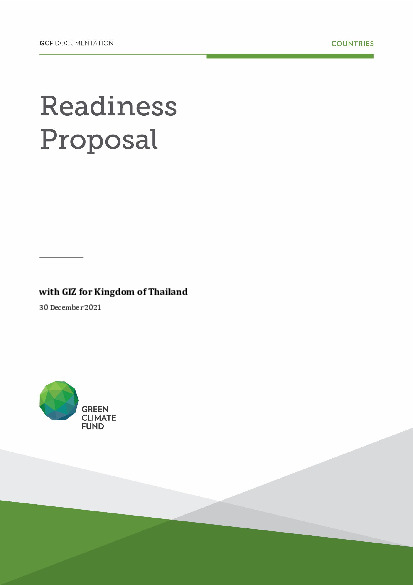Building project pipeline capacities: Development of GCF concept notes in the transport and health sectors in Thailand

Building project pipeline capacities: Development of GCF concept notes in the transport and health sectors in Thailand
To enable the development of priority climate change projects in Thailand, critical skills need to be built up in Thai institutions to identify robust project ideas as well as suitable financial mechanisms, and to access the necessary financial sources, including international funds, for their implementation. The health and transport sectors are among the key sectors in Thailand that require urgent action in terms of climate change mitigation and adaptation, but still lack a high-impact project pipeline and stakeholder capacities regarding GCF project development. This Readiness support addresses this twofold challenge by building capacities within Thai institutions for project pipeline development, and by co-developing two concrete concept notes for projects within the aforementioned priority sectors, considering both grant and non-grant instruments.
To steer and guide processes for accessing climate finance for Thailand, some barriers remain for concrete climate change actions, including limited domestic capacities to develop climate-related project ideas which also consider private sector involvement and investment, limited knowledge of GCF opportunities and access modalities, limited technical capacities concerning e.g. the alignment of projects with GCF investment criteria and the lack of a well-designed dialogue between the NDA, its partners and stakeholders. For the transport sector and e- mobility in particular, the market assessment of scaling up and replicability potentials, the analysis of cost effectiveness and efficiency, the potential to leverage investments from the private sector and address financial viability in the long run, as well as demand-side regulatory support remain challenging. In addition, there are capacity gaps for developing robust, evidence-based climate rationales to justify additional ‘resilience’ investment. For the health sector, the financial capacity for investments in resilience, particularly for small to medium-sized private hospitals, and potential public and private sector (co-)financing mechanisms for the implementation needs to be assessed. Recent efforts to enhance collaboration between climate policy and science institutions in Thailand provide momentum to address this gap in a sustainable manner and strengthen the in-country capacities for climate science-based project development for the future.
Through institutional capacity building and co-development of concept notes this Readiness support will directly benefit the following groups of actors:
- Sectoral agencies, e.g., under the Ministry of Public Health, Ministry of Transport, as well as climate science and policy institutions such as the Thai Meteorological Department (TMD), ONEP and the NDA, will be enabled to identify high-impact projects and to develop high-quality concept notes for submission to the GCF
- Candidates for Direct Access Entity (DAE) accreditation to the GCF will be closely engaged on the concept note development process. Throughout the process they will be strengthened and familiarised with GCF standards and requirements and will be enabled to potentially take the concept notes forward to development and implementation of funding proposals; either directly, if their accreditation is successfully completed, or in collaboration with other accredited entities (matchmaking)
- Stakeholders in the targeted sectors, including NGOs and the private sector